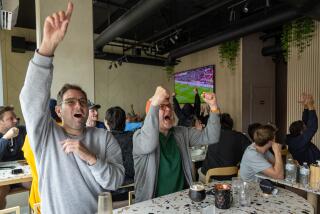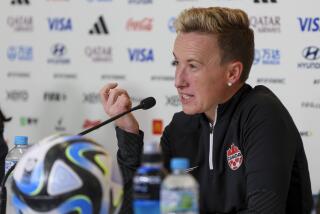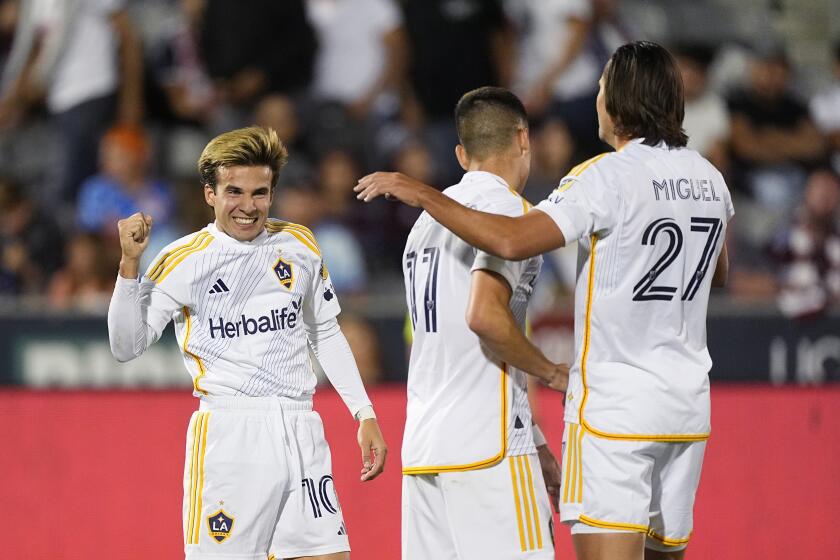Once Dubbed the ‘Beautiful Game,’ Soccer Takes an Ugly Turn
LONDON — Pele once called it the “beautiful game.” Soccer is anything but nowadays.
The world’s most popular sport used to be about who scored the most goals, thrilled the fans and won the top titles. Now international soccer is plagued by cheats, drugs, hooliganism, racism, embarrassing blow outs and most recently, tragedy.
In South Africa on April 11, 43 fans were killed in a stampede at a soccer game, the third time in less than a year that fans died at overcrowded stadiums in Africa.
Keith Cooper, spokesman for FIFA, soccer’s world governing body, acknowledged the sport has seen better days. He said the problems are “diverting attention away from what we should be watching.”
“Sadly the trend is in the wrong direction,” he said.
“Any activity as widespread and diverse as football involving so many people in so many countries is bound to throw up a few situations, some of them less comfortable than others.”
Most of the problems result from the sport’s own popularity.
FIFA boasts that about 240 million people play soccer and, to satisfy that huge interest, television has flooded the market with live games from every country.
But soccer has made TV pay a high price for that coverage. The boom has led to spiraling salaries and transfer fees.
Some teams that can’t keep pace have turned to cheating. Across Europe, clubs import players from central and South America, using false passports to get around European Union labor laws that try to keep them out.
In Italy, prosecutors are investigating at least two dozen foreign players for alleged passport violations.
The transfer market has also opened the way for coaches to demand large financial kickbacks from players’ agents for making the deals go through.
Arsenal coach George Graham was fired in 1996 and suspended from the game for a year in a transfer-payments scandal. Similar cases have emerged recently in other countries, notably Croatia.
Bribery and match-fixing cases made headlines in 1995 when former Liverpool goalkeeper Bruce Grobbelaar and three other stars went on trial in England, accused of accepting cash to throw games.
Although they were eventually acquitted, Grobbelaar was suspended for six months after admitting he broke Football Association rules by forecasting results for a gambling syndicate.
Last month, the Italian soccer federation suspended four Atalanta players and two from Pistoiese for up to a year after finding them guilty of fixing the result of an Italian Cup game in August. A German player was jailed for five months in Singapore.
Despite campaigns by FIFA and national federations, racism seems as rife as ever on and off the field.
A 15-year-old junior player of mixed African and Norwegian parentage was stabbed to death in an Oslo street after speaking out against racism.
On the field, Lazio’s Yugoslav defender Sinisa Mihajlovic was suspended for two games by the Union of European Football Associations for racist taunts aimed at black Arsenal players. The Roman club has been fined for the racist banners and chants of some of its hard-core fans.
“Racism is showing its ugly face all over the place,” UEFA president Lennart Johansson said. “We all tend to do what is expected and no more.
“We don’t do enough to hinder it and governments don’t do enough. We all know what happened in Nazi history. We must now analyze all these signs and do what is necessary.”
In Albania in March, black players on the England under-21 team were jeered by the home fans whenever they touched the ball.
England’s national team is followed by a large number of racist and xenophobic troublemakers. Violence by English hooligans at last summer’s European Championship in Belgium and the Netherlands almost got the team kicked out of the tournament.
Admitting that many of the English thugs were members of the officials supporters’ club with guaranteed tickets to games, the Football Association scrapped the entire 27,000 membership in February in hopes of weeding out the hooligans.
While crowd trouble in England has died down, soccer violence happens just about every week in Argentina, Brazil and Italy, and seems to have spread to countries not previously known for it.
UEFA imposed a record fine of $592,000 on French club Paris Saint-Germain last month after a Champions League match against Turkish club Galatasaray after 50 people were hurt in crowd violence.
The ideals of sportsmanship also have taken a hit.
Australia was criticized for rolling up record scores in World Cup qualifiers, beating American Samoa 31-0 and Tonga 22-0.
A number of players have tested positive for the banned steroid nandrolone, while others have been caught taking recreational drugs.
Christoph Daum was on course to take over as coach of the German national team until a positive test on a strand of his hair backed up accusations he had been using cocaine.
Soccer also has been linked to the exploitation of children in Asia. Sporting goods companies have been accused of turning a blind eye to the practice of using children as young as 10 to make balls.






